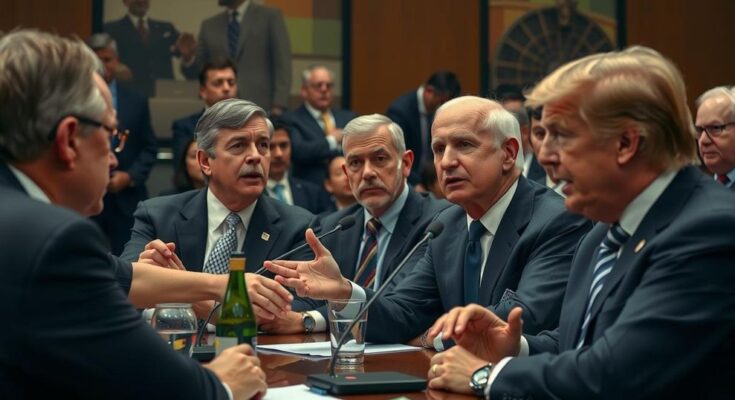Donald Trump’s Cabinet picks have sparked controversy, with controversial appointments like Matt Gaetz as attorney general and Pete Hegseth for defense secretary. His approach, aiming to hasten the confirmation process via recess appointments, suggests a broader ambition to reshape federal governance rapidly. Mixed reactions from Republican senators reveal a landscape of uncertainty as Trump’s administration seeks to assert power and challenge established norms.
In the wake of Donald Trump’s surprising Cabinet picks, a shift in Washington’s political landscape looms. Noteworthy among his choices is Rep. Matt Gaetz as attorney general, a man embroiled in ethical scrutiny due to allegations of sexual misconduct. Similarly, the appointment of Pete Hegseth for defense secretary raises eyebrows, as does Tulsi Gabbard’s nomination for national intelligence director—each selection seemingly crafted to provoke and challenge traditional norms. Political analysts suggest Trump aims to shake the foundations of the status quo. Scott Jennings, a CNN political commentator, spoke on Gaetz’s appointment, noting Trump’s knack for forcing unconventional nominees through a Republican-controlled Senate, especially since he perceives a mandate after winning the election. The dynamics of these nominations suggest a willingness to redefine how power is wielded within the government. Trump’s aspirations aren’t just about appointments; he’s pushing for expedited staff selections through what are known as “recess appointments.” This method could allow him to bypass Senate confirmations altogether, apportioning considerable power to an administration that prioritizes speed over traditional checks and balances. Notably, Trump envisions a dramatic overhaul of both national security and the Justice Department, further echoing his long-standing grievances against inquiries tied to the election interference of 2016. The reaction among Senate Republicans is mixed; while some express shock or uncertainty at Hegseth’s nomination, others reaffirm their trust in Trump’s decision-making. Markwayne Mullin, a supportive senator, acknowledged the need for Gaetz to win over the Senate, hinting at the contentious pathway these nominees may encounter. At the same time, there looms a sobering reality: Trump intends to move rapidly to implement a broader agenda during his limited time in office—echoing observations that previous presidents have often enjoyed the most significant victories in their early terms. Moreover, there’s speculation on Trump’s desire to evaluate the loyalty of military generals and the unconventional choice of entrepreneurs like Vivek Ramaswamy and Elon Musk for government efficiency roles—a move that raises questions about practicality and feasibility in financial terms. As Trump traverses uncharted territory by balancing personal loyalty and functional capability, the implications for his presidency become increasingly complex. Even likely recess appointments spark debate about constitutional roles, suggesting that despite majority control, Republicans remain wary of relinquishing their influence over government appointments. John Thune, the emerging leader among Senate Republicans, expressed the intent to maintain a traditional confirmations process while navigating the logistics of Trump’s ambitions. Amid these developments, the enduring battle over the legislative filibuster and the fate of a smaller Republican majority in the House point to a convoluted picture for the future of governance. Trump’s second term promises to be a tale of audacity, alliance, and an unyielding quest for power—both within his Cabinet and the broader political arena.
As Donald Trump approaches the formation of his Cabinet following the presidential election, the selections he’s making are raising eyebrows and stirring controversy. Each choice appears calculated—designed not only to populate crucial government positions but also to provoke the political establishment and test the limits of executive authority. The potential implications of these selections extend to how legislation may unfold under his administration, particularly in terms of Senate confirmations and the influence of Republicans who are ambivalent about the unconventional figures Trump is elevating to power.
Overall, Trump’s Cabinet selections mark a definitive statement on his intentions to reshape the federal landscape, challenging existing norms and questioning traditional pathways to power. As he pushes for rapid implementation of his vision, the dynamics of Washington may shift, bringing both opportunities and conflicts to the fore. The tale unfolding in D.C. is one of ambition, resistance, and a relentless quest for authority as Trump stands poised to redefine the very fabric of governance during his impending term.
Original Source: www.cnn.com



